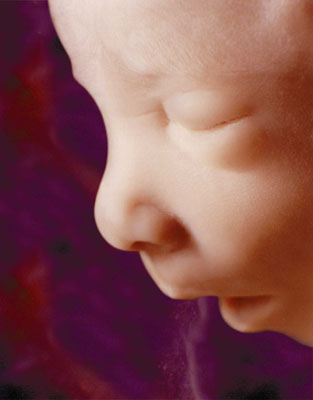Live Action President and Founder Lila Rose appeared on Dr. Phil on Monday to discuss life in America following the fall of Roe v. Wade. The episode covered multiple abortion-related topics but focused heavily on a couple from Louisiana that was recently refused an abortion for their baby who had been diagnosed with a life-threatening condition and was deemed likely to die at birth. Also appearing remotely was pro-life Louisiana Senator Katrina Jackson (D).
“Carry to Bury”
In August, at 10 weeks pregnant, Nancy Davis and her partner Shedric learned about their baby’s diagnosis of acrania. Doctors told them they should have an abortion, but then told them that they couldn’t have the abortion in Louisiana because of a new pro-life law.
Ben Crump, a civil rights attorney representing the couple, told Dr. Phil, “Louisiana was one of the first states to institute draconian laws that said no matter what that situation is, a woman cannot choose to get an abortion even if the doctors told her that there was 99.9% chance that her baby would die in minutes after it came through her womb. And I understand, Dr. Phil, you’re a mental health expert. I cannot imagine the mental anguish of a woman that has to deliver a baby that she sees come out of her and then they pronounce it dead.”
There are two clear problems with this statement. The first is that the Louisiana law does not prohibit abortion in the case of life-threatening fetal diagnoses. Senator Katrina Jackson, the author of the Louisiana law, told Dr. Phil that she wrote the bill without an exception but a medical futility exception was later added.
“When people say the Louisiana law forced this, it was not Louisiana law, it was overzealous physicians — and I respect them — who refused for three or four days to take the advice of the Lousiana Department of Health that the exception was in place,” she explained. “So I’m not sure how much clearer it could be. The bill was written because we wanted to ensure there was no confusion.”
Dr. Phil later read the list of health conditions that Louisiana law determined were a fate worse than death and therefore aborting babies with those conditions would be legal. While acrania is not currently listed, a related condition — anencephaly — is listed, and there is also a provision stating that if two doctors agree a baby will not survive at birth, then abortion is allowed.
When asked, Davis confirmed that Louisiana doctors did reach out and tell her they could actually do the abortion, but by then she didn’t trust them because if they couldn’t “understand the rule and interpret that to where they could have assisted me […] then I don’t trust them to do anything else.” Davis traveled to New York to undergo an abortion at 16 weeks (four months).

Preborn baby at 16 weeks
The second problem with Crump’s statement is that women who carry to term knowing their baby isn’t likely to survive actually have better mental health outcomes than women who abort because of a prenatal diagnosis. According to a study in the journal Prenatal Diagnosis, there appears to be an emotional benefit to carrying to term. Another study found that after 16 months, 20% of women who terminated for fetal diagnoses “showed pathological levels of post-traumatic stress.” Yet another study found that 14 months after aborting for a fetal diagnosis, nearly 17% of women were diagnosed with a psychiatric disorder such as post-traumatic stress, anxiety, or depression.
Women who choose abortion for their babies after a prenatal diagnosis are at an increased risk of emotional distress compared to those who choose to carry their babies to term.
The pro-life position
Following Jackson’s explanation of the law, Lila Rose appeared along with that National Organization for Women (NOW) president Christian Nunes. While Nunes was quick to call abortion “a human right” that doctors should administer, Rose pointed out the truth. She told Davis:
Nancy, my heart broke when I heard your story because that’s the worst thing any mom wants to hear is that their baby is gonna die, their baby has a life-threatening illness. My husband and I, we had a miscarriage about two years ago. Those were some of the darkest days of my life and they were dark days because it was our child. We knew this was a baby and I think that’s the fundamental point here is that we’re talking about a baby. We’re talking about a human life. And the pro-life position is that all humans have human rights and the first right is life — to not be killed.”
She explained that doctors should have offered Davis perinatal hospice or palliative care so that her baby could have died in her loving arms “instead of at the abortionist’s tools.” With perinatal hospice, Davis and the rest of the family, including her husband and their born children, could have had the chance to meet the baby and say goodbye.
@LilaGraceRose compassionately responds to a heartbreaking story of a child who was tragically killed after receiving a grim prenatal diagnosis in the womb. pic.twitter.com/7SsUQ6ibOp
— Live Action (@LiveAction) September 12, 2022
Attacking Rose
Crump went on to claim that due to the fall of Roe, “This is the first time in history that a right has been taken away from individual citizens, in this instance the right for a woman to choose.” Yet, there was never actually a Constitutional right to abortion — the judiciary at the time decided to essentially create one “out of thin air,” according to one legal scholar.
.@LilaGraceRose powerfully responds to abortion advocate on @DrPhil:
"Laws are meant to protect the weak. Who is the weakest in our society? A child.
Whether you live 10 minutes, 10 years, or 100 years, you're a human and have the right to not be killed."
RT! pic.twitter.com/IkzDnjRRXs
— Live Action (@LiveAction) September 12, 2022
A woman in the audience spoke out to agree with Crump, with her attention focused on Rose.
“Lila, I really feel like your views, you just want to legislate evil. That’s really how it feels when I hear you speak, especially when you’re talking about a ten-year-old girl that was raped,” she said. “To hear you say that they should just have it anyway is disgusting. I really think you’re a traitor to your own.”
The audience member argued that there is no child to save because the child isn’t born and is therefore “not there.”
Rose responded, “Laws are meant to protect the weak. Who is the weakest in our society? A child. Whether you live 10 minutes, 10 years, or 100 years, you’re a human and have the right to not be killed.”
Also in the audience was Susan Swift Arnall, Vice President of Legal Affairs for The Right to Life League and a civil rights attorney for the preborn, who explained, “What we [pro-lifers] do is fight for all lives. That’s what the pro-life movement is actually about. It is a civil right. We have to defend all life. All life is protected from the moment of conception.”
Human life begins at fertilization
Dr. Phil disagreed with the fact that science proves life begins at fertilization, however. He told Rose, “The scientific community does not have a consensus about when human life begins” and that the “body of scientific literature” points to different moments in development at which different scientists believe life officially begins.
Yet, the most prominent scientific journals all agree — a new, distinct human life begins at fertilization.
While other cells can be classified as “alive” or “living,” at the moment of fertilization a new human being exists who is fundamentally different from his or her parents, and definitely different than a single sperm cell or egg cell. A quick Google search provides a top result from Princeton, showing countless quotes regarding the scientific fact that human life begins at fertilization. Embryology textbooks have, for years, acknowledged that fertilization is the moment a new human life begins. In addition, the American College of Pediatricians states:
The predominance of human biological research confirms that human life begins at conception—fertilization. At fertilization, the human being emerges as a whole, genetically distinct, individuated zygotic living human organism, a member of the species Homo sapiens, needing only the proper environment in order to grow and develop. The difference between the individual in its adult stage and in its zygotic stage is one of form, not nature. This statement focuses on the scientific evidence of when an individual human life begins.
However, there are some scientists who, despite knowing that a new human life begins at fertilization, choose not to treat that as an equally valuable human life. That, however, is an issue of philosophy, not one of biology. Dr. Phil may be conflating the two.
Abortion at any time for any reason
The episode concluded with the fact that, under the guise of being “pro-choice,” groups like NOW want abortion legal right up until birth. When pressed by Rose, Nunes admitted, “It’s not for our organization or myself or anyone else or advocate to determine where that point is for [women] regarding the gestational age of when they seek abortion care.”
This is an attempt to turn “abortion on demand” into what sounds like a push for equality and choice. But, as Rose told Nunes and the audience, “The abortion position… is abortion up until the moment of birth for any reason. It’s an extreme, extraordinary position, and that’s built on this idea of dehumanizing the child in the womb — which is what the abortion position has done. It’s saying they’re not human if they’re conceived in violence, if they have a disability, if they’re really sick, kill them. That’s the abortion position and the pro-life position is saying, ‘Treat them like a human being. Treat them with dignity.'”
The government in people’s lives
During another key moment at the end of the show, Dr. Phil spoke to the audience, implying that he does not agree with the government legislating abortion. “I get really nervous when the government gets into people’s personal lives,” he said. Yet the laws of our nation are dictated by the government and those laws prohibit countless acts that could be considered “personal” such as child abuse, spousal abuse, theft, and murder — and even the use of certain drugs.
The two unasked questions
When discussing with Dr. Phil how much emotional turmoil the situation had put her through, Davis said she didn’t want to carry a baby just to bury the baby. But all that her abortion did was kill her baby more quickly than acrania would have. She lost what could have been weeks with her child because she didn’t want to bury her baby.
If she didn’t want to bury her baby, where is her baby now? There is always a dead body following an abortion, yet no one is asking what happened to these children. Typically, children who are aborted are disposed of as medical waste.
Another question Dr. Phil failed to ask is what type of abortion was used. At 16 weeks, the most common abortion procedure is the D&E (dilation and evacuation) abortion, which dismembers the child by ripping her arms and legs from the trunk of her body.
The other option would have been an induction abortion, though those are usually carried out later in pregnancy after 22 weeks. In that procedure, a heart attack is induced in the child using a drug injected into the baby’s head or heart.
Abortion is never the answer to any problem whether it be physical, emotional, social, or financial. Rose boldly and bravely shared the pro-life message with Dr. Phil’s nearly three million viewers on Monday and likely changed hearts and minds on the issue.
“Like” Live Action News on Facebook for more pro-life news and commentary!







